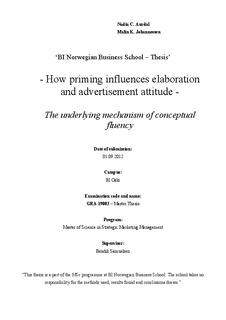| dc.description.abstract | To our recollection, a theoretical gap in previous priming research, especially within contextual priming, is the failure to include fluency as the explaining mechanism behind priming effects. This is a limitation, as fluency theory predicts different effects of priming on elaboration and argument sensitivity, than what has been proposed by e.g. Samuelsen (2004). Moreover, to our knowledge, prior studies have not compared effects of different priming methods. The purpose of this study was therefore two-folded: First, we aimed to include fluency theory as the explanation behind priming effects, and see how priming influenced elaboration and advertisement attitude. Second, we tried to make a methodological contribution, by comparing contextual (editorial) priming and sentence scrambling. A study extending Samuelsen’s (2004) dissertation was therefore conducted. Using the ostensibly unrelated procedure, participants where either primed with an editorial or a sentence scrambling task, making a functional or experiential concept salient. This was done to manipulate level of congruence, resulting from the match between the content of the prime and the content of the advertisement. They were then exposed to one of two versions of a functional advertisement for a fictitious shampoo brand, consisting of either strong or weak arguments, and asked to give cognitive responses and attitudes towards the advertisement. Five hypotheses where then tested. Although these were not statistically supported, the findings have important theoretical and practical implications. The most remarkable was that fluency theory only seems applicable for contextual priming, as participants in both the congruent and incongruent conditions were insensitive to the argument quality manipulation. This is likely the result of the task only requiring a low level of task involvement. For sentence scrambling participants, however, fluency theory is discarded. Here, level of congruence affected elaboration. Participants in the congruent conditions were more likely to elaborate, and as a consequence, they were more sensitive to argument quality manipulations. This resulted in less fortunate advertisement attitudes if weak arguments compared to if strong arguments. This enhanced argument quality sensitivity is probably due to higher task involvement. This finding was in line with Samuelsen’s (2004) reasoning, which is based on the multiple roles of persuasion variables postulate in the ELM: Congruence is likely to facilitate elaboration, as the primed content is both more accessible and applicable to the target - two prerequisites necessary for the priming effect to occur. | no_NO |
